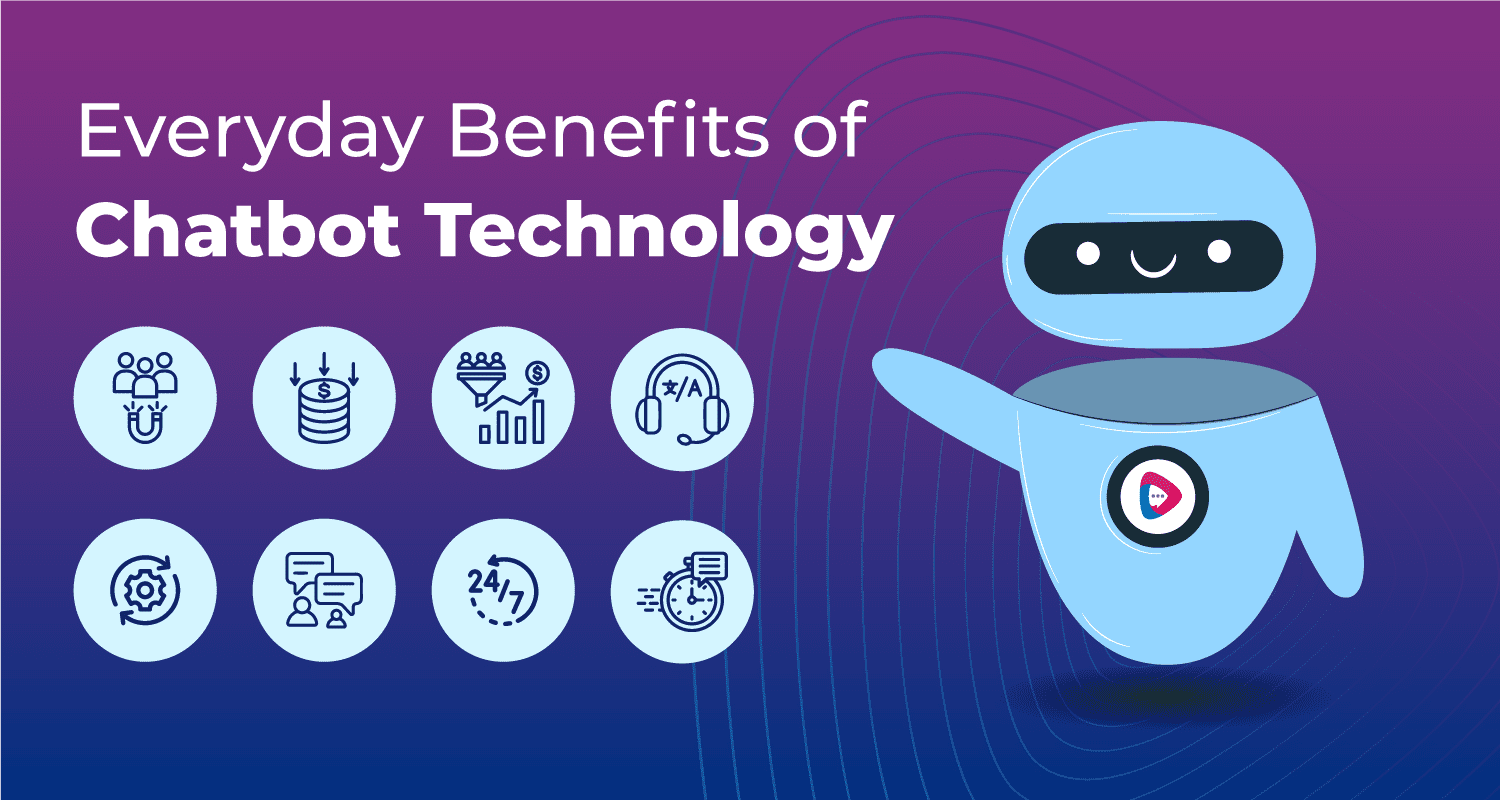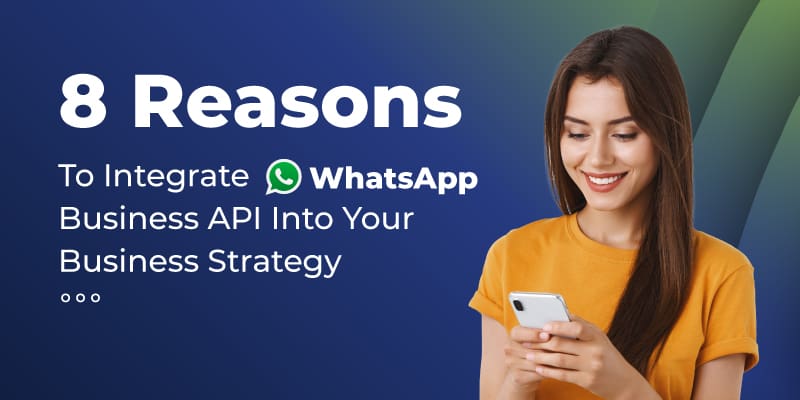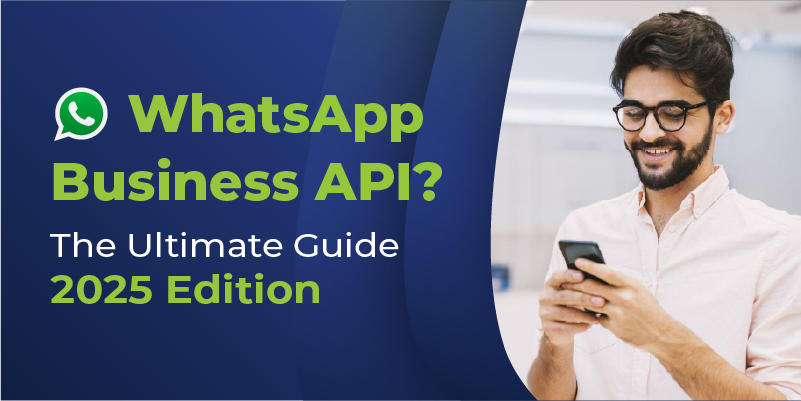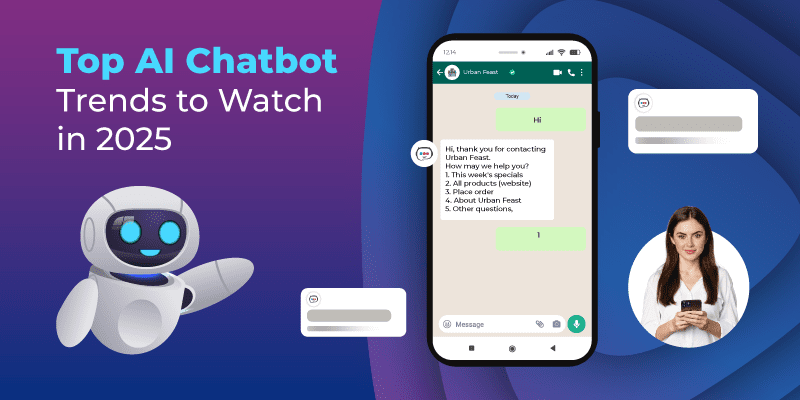Table of Contents:
As per Gartner, by 2027, around 25% of companies predicted to rely on chatbots as their primary customer service channel.
And we think, given the rate of AI adoption, this is generous! Juniper Research says that global retail spending on chatbots is forecasted to hit $72 billion by 2028, going up from $12 billion in 2023.
While businesses are leveraging this technology, you might be on the fence with skepticism, hesitation, or just resistance toward change, possibly because you have yet to comprehend the significance of AI chatbots in business and what they have to offer.
So, here are some primary benefits of AI chatbots for both businesses and their customers so you know what it is like to be at both ends with a chatbot on the one.
A Brief On Chatbot Technology
AI chatbots are more advantageous than chatbot technology powered by Natural Language Processing (NLP) ability to understand the nuances, context, and sentiment of human language, making it respond in the most helpful, personalized, and natural way.
These are the perfect customer engagement, communication, and marketing tools with the perfect balance of automation and personalization.
There are three types of chatbots:
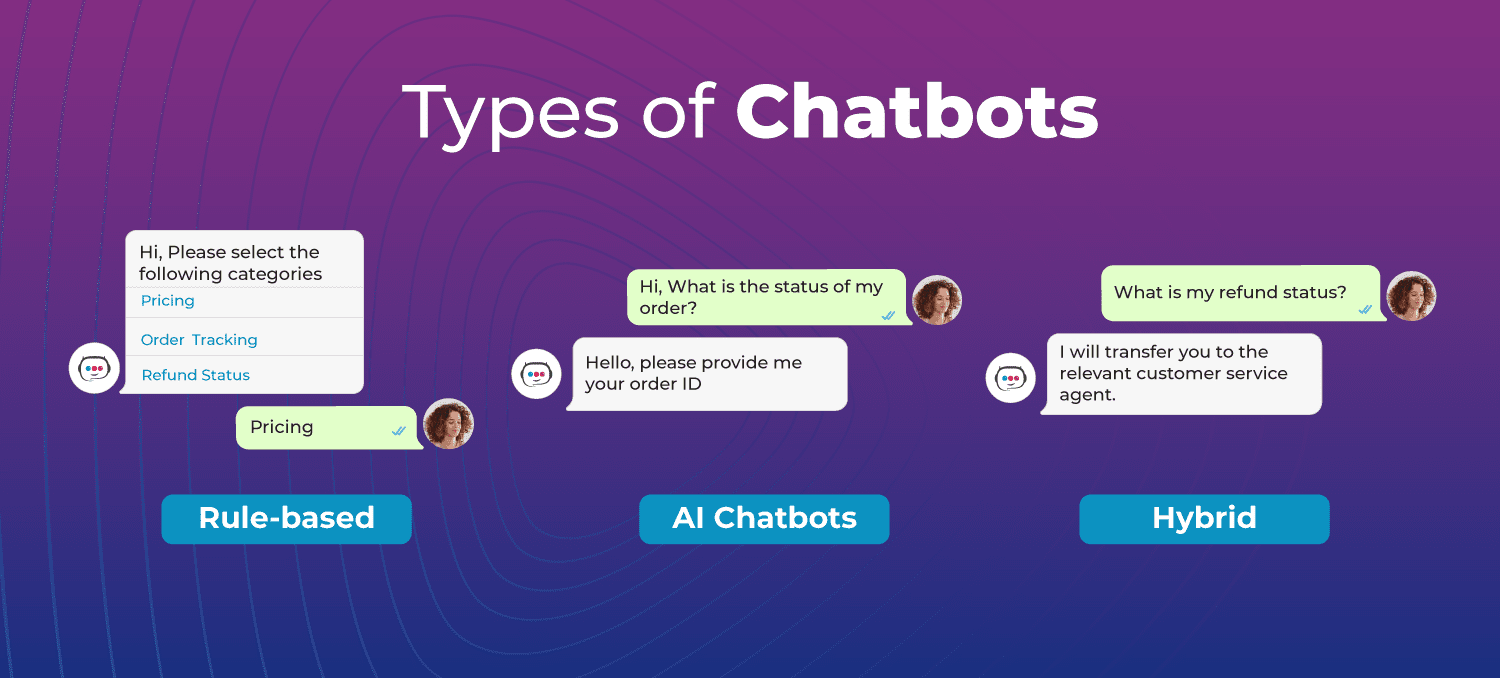
- Rule-based chatbots: These are preliminary chatbots that provide users with various options and let them choose one to get answers to specific queries. They have a limited number of questions that they have trained to answer, mostly used for basic FAQs.
- AI chatbots: These advanced chatbots leverage AI technology and its components like machine learning, NLP, and text analysis to understand human language and respond more comprehensively.
- Hybrid chatbots: As the name suggests, hybrid chatbots are a blend of both rule-based and AI-driven chatbots. They function on limited rule-based tasks but also can understand user intent and context, making them perfect for resolving retail, ecommerce, and other sector queries on their website. These are the most commonly seen chatbots businesses use, and customers interact with.
Also Read: Guide to Choosing a Chatbot that’s Right for Your Business
Everyday Benefits Of Chatbot For Business
Generating Leads
Chatbots leverage conversational AI and personalized data to interact with prospects. They help them right from the beginning, from understanding the product or service itself and forwarding it to sales staff as a qualifying lead. Chatbots are designed to send constant reminders and follow-ups, ensuring the prospect returns to the website.
Automation
Chatbots enable businesses, especially AI-powered Chatbots equipped with machine learning algorithms and data analytics capable of automating mundane, day-to-day or any task that doesn’t require creative input or just repetitive like:
- Answering FAQs repeatedly to different customers
- Manually accepting and scheduling appointments
- Customer journey processes
- Sending regular updates, status, or alerts
With advanced AI chatbots, companies are able to collect and analyze large data sets to customize the responses as per the situation.
Save Cost
Chatbot’s ability to automate customer service and support, day-to-day repetitive, mundane tasks, and other processes will save a lot of money on hiring human staff and spending on resources to fulfill it.
Implementing chatbot technology into your business is much cheaper. With the help of the right business service provider, like Route Mobile, it is more efficient, time-saving, and simplified using a CPaaS solution.
Get Customer Feedback
The search engine volume is expected to drop by 25% by 2026 due to the increasing usage of AI chatbots. And since the chatbot is trained upon data and grows upon a feedback loop, this will only get more powerful.
Hence, it is the best tool or platform to collect data from potential customers. Brands can utilize the chatbots to run customer satisfaction surveys or questionnaires for better understanding.
More importantly, you can store, optimize, and analyze this data to identify customers’ needs and commonalities, helping brands to strategize better in personalized targeting.
Conversational Marketing
Chatbots can be an integral part of core marketing strategy. Many brands leverage AI chatbots for conversational marketing to provide personalized recommendations and get customers down the journey toward sales using conversational AI capabilities.
They collect data that can be used further for personalizing or better targeting marketing campaigns on other platforms like email or social media.
The conversational AI features machine learning NLP and can understand the context and sentiment well. It is perfect for initial customer support before the actual sales or marketing person can join the conversation.
Also Read: How do NLP Chatbots Work?
24/7 Customer Service
Unlike humans, chatbots can easily be available around the clock to answer customer queries, which can come at any point in time.
Chatbots can instantly reply, share essential information, or point users to the right product. It can be late at night or early in the day when the support team is unavailable.
This will prevent so many potential customer drops as the chatbot will always assist them.
Route Mobile’s Roubot can be a perfect choice for chatbot customization, depending on your industry and application. It is equipped with a drag-and-drop builder, a robust dashboard, and many other features.
Good Read: An Overview of Roubout’s Unique Applications
Multilingual Support
Chatbots are also a great local marketing tool or strategy that can answer in any language the customer is comfortable with.
This only opens up so many opportunities, ranging from local customers across states or regions as well as international customers from different customers and their native languages.
Customers are able to understand the product or get proper support in their language.
Personalized Customer Experience
44% of potential buyers become repeat customers after they receive a personalized customer experience.
Chatbots, through personalization, elevate the customer experience to another level. It is about catering to the exact requirements and preferences of a particular individual.
It also helps in overall approach, conversational marketing, and product recommendation, which makes customers feel seen, validated, and accommodated.
Faster Response Time
Chatbots across diverse messaging platforms, including RCS business messaging, WhatsApp, Telegram, and Facebook Messenger, offer the highest response time to reduce the bounce rate of incoming potential leads.
In fact, 96% of online shoppers expect a response just within five minutes. Chatbots can provide instant responses and initiate human-like conversations with the customer for higher engagement and assured conversion.
It not only reduces wait time for customers or fills the gap between unavailable human support staff in off hours and the customers reaching out but also solves hundreds of queries quickly.
Quick Purchasing
Chatbots allow customers to make the purchase straight from their chat without redirecting them to a website or another app., Or they are only sent directly to the checkout page just to finish the purchase.
In fact, 35% of consumers have already made purchases through chatbots.
This not only elevates the whole retail or ecommerce experience of customers but also makes buying so convenient, quick, and easy, reducing friction points between the initial contact and the final checkout.
Conclusion
The role of AI chatbots for businesses and customers is evidently significant through these listed benefits.
Businesses generate leads, help in customer engagement, reduce cost, and aid in marketing, whereas they offer fast, highly responsive, and 24/7 customer support along with much more personalized and elevated customer experience throughout their journey.
We at Route Mobile recognize the potential of chatbot integration for businesses and offer next-gen communication services as software or platforms for enterprises across industries. Contact our team to get you started with our chatbot integration!
FAQs
How Does Chatbots Help Reduce Cost For Businesses?
As chatbots are able to provide customers with instant automated replies and customer support and hold initial conversations, it dramatically reduces the need for expensive call centers and support teams, saving a ton of money for enterprises.
What Are All The Types Of Chatbots?
- Rule-based chatbots
- Menu-based chatbots
- Hybrid chatbots
- Contextual chatbots
- Keyword-recognition based chatbots
- Voice-enabled chatbots
What is the Difference Between Rule-based Chatbots and AI Chatbots?
Rule-based chatbots are static, limited, and basic in their functionality as these can only respond to a set of pre-decided questions and cannot learn from user interaction, whereas AI chatbots are dynamic, versatile, and can learn from interaction through data analysis, and make human-like conversation.

